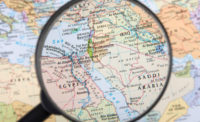A recent survey of more than 570 U.S.-based corporate security professionals, travel managers, human resources executives, medical professionals and others reveals that 40 percent of respondents identify Latin America as the region that poses the greatest risk to their business travelers in 2011. Nearly one-third of respondents (31%) identified the Middle East as presenting the greatest risk to travelers, followed by 20 percent who identified Asia. Respondents were most concerned about the effect of terrorism and civil unrest on their mobile workforce (44%). Natural disasters (21%) ranked as the second highest area of concern among the group which included security directors from major international organizations. Petty theft and crime, and kidnap and ransom received 17 and 16 percent of the vote, respectively, with maritime security receiving only two percent. Other key findings: The Americas and Asia Pacific regions were those most frequently reported as the site of travel security incidents in 2010, according to International SOS data. India and Mexico followed. The survey was conducted during a by-invitation-only webinar held last week by International SOS, an international healthcare, medical and security assistance and concierge services company. The event, "Global Security Risks 2011: Looking Ahead," offered participants an overview of current global travel security risks - including new developments in Mexico - as well as best practices around duty of care and travel risk management for employers seeking to safeguard their expatriates and traveling employees. Mexico remains high on companies' lists of security concerns - it was the country researched on International SOS' member website most often in 2010, second only to India. Though crime rates there are lower than in a number of other Central and South American countries, the speed at which the crime has increased coupled with the concentration of violence near the U.S. border keeps Mexico top of mind as a business travel security concern, survey results and member feedback indicate. "Though risk is inherent to travel, security incidents can be avoided with the right information and guidance," said International SOS Vice President for Global Security and Intelligence John Rendeiro. "By putting a travel risk management plan in place, specifically one that prepares, tracks, informs and responds to employees, you are protecting your company's most important asset - its people. And by including a duty of care strategy, this also protects a company's reputation and decreases liability across the board."
Survey Says Latin America and Middle East are Riskiest Regions for Business Travel

A recent survey of more than 570 U.S.-based corporate security professionals, travel managers, human resources executives, medical professionals and others reveals that 40 percent of respondents identify Latin America as the region that poses the greatest risk to their business travelers in 2011. Nearly one-third of respondents (31%) identified the Middle East as presenting the greatest risk to travelers, followed by 20 percent who identified Asia. Respondents were most concerned about the effect of terrorism and civil unrest on their mobile workforce (44%). Natural disasters (21%) ranked as the second highest area of concern among the group which included security directors from major international organizations. Petty theft and crime, and kidnap and ransom received 17 and 16 percent of the vote, respectively, with maritime security receiving only two percent. Other key findings: The Americas and Asia Pacific regions were those most frequently reported as the site of travel security incidents in 2010, according to International SOS data. India and Mexico followed. The survey was conducted during a by-invitation-only webinar held last week by International SOS, an international healthcare, medical and security assistance and concierge services company. The event, "Global Security Risks 2011: Looking Ahead," offered participants an overview of current global travel security risks - including new developments in Mexico - as well as best practices around duty of care and travel risk management for employers seeking to safeguard their expatriates and traveling employees. Mexico remains high on companies' lists of security concerns - it was the country researched on International SOS' member website most often in 2010, second only to India. Though crime rates there are lower than in a number of other Central and South American countries, the speed at which the crime has increased coupled with the concentration of violence near the U.S. border keeps Mexico top of mind as a business travel security concern, survey results and member feedback indicate. "Though risk is inherent to travel, security incidents can be avoided with the right information and guidance," said International SOS Vice President for Global Security and Intelligence John Rendeiro. "By putting a travel risk management plan in place, specifically one that prepares, tracks, informs and responds to employees, you are protecting your company's most important asset - its people. And by including a duty of care strategy, this also protects a company's reputation and decreases liability across the board."
Looking for a reprint of this article?
From high-res PDFs to custom plaques, order your copy today!





